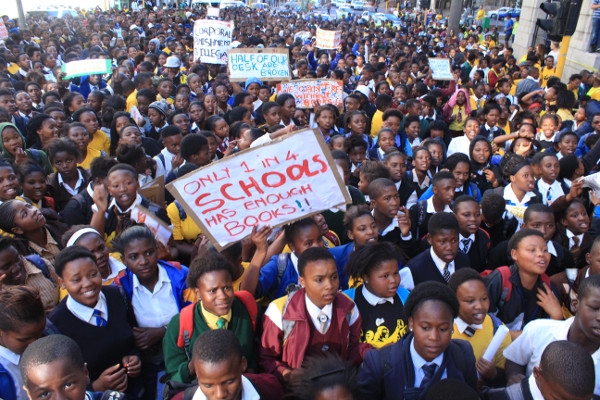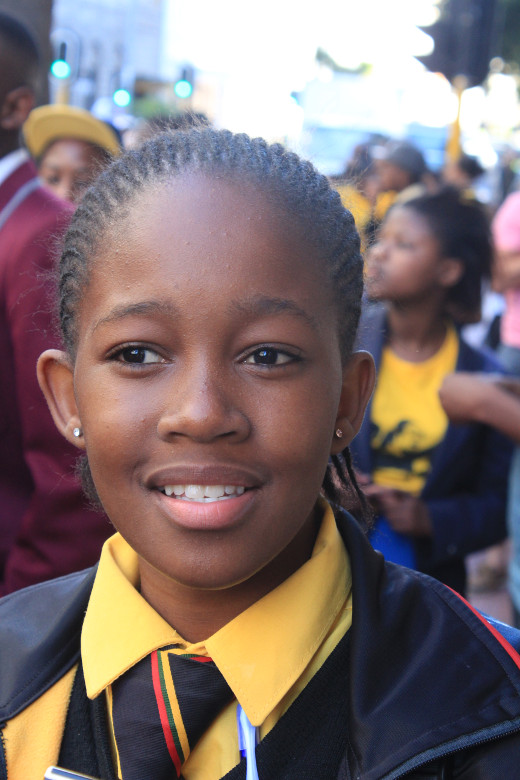

Students marched through Cape Town on 31 October demanding an end to unequal education. Photo by Masixole Feni.
1 November 2014
“In my school we have two main problems. The first one is a lack of water. Our taps are not working properly,” said Phila Biyongo, a grade 9 student at Simanyene High School in Strand, as she marched through Cape Town city centre yesterday afternoon in a protest organised by Equal Education.
Biyonga continued, “[The taps] run dry and there is no water to flush the toilets. Apart from that the toilets are dirty and some of them don’t even have doors. [The second problem is] a lack of staff. For example you find that teachers teach two subjects at a time, which tires them out and it becomes difficult for us as learners to be taught by someone who is tired.”
“Amandla” was continuously chanted in the Cape Town central business district as students marched to the provincial legislature to rally against education inequality. An Equal Education spokesperson estimates that about 2,500 people participated.
The march highlighted several issues including corporal punishment, lack of school libraries, safety and security in and outside school, poor sanitation and infrastructure in township schools.
Wearing bright yellow Equal Education t-shirts over their school uniforms, Wale Street was packed with learners from township high schools such as Simanyene, Masiyile, Chris Hani and Joe Slovo, to name a few. The march slogan was “Fight Educational Inequality!”

Phila Biyonga says her school has a shortage of teachers. Photo by Masixole Feni.
A Masiyile student who addressed the marchers from the back of a bakkie spoke in anger as he told them that they had a big problem with corporal punishment at their school. Corporal punishment is illegal in South Africa.
“We get into physical fights with our teachers because you don’t understand why you are being beaten when you don’t even get beaten at home by your parents. I was beaten seven times for not doing homework. This has to stop, we want justice. We want an end to corporal punishment. We want equality,” he said.
After testimonials were given by learners from several schools, the marchers started singing louder and louder while waiting for education MEC Debbie Schafer to come and accept their memorandum. They waved posters with messages such as “Half of our toilets don’t work”, “Dignified sanitation now”, “Let us use our labs”. The marchers also chanted a song demanding that Schafer appear.
Schafer emerged and the marchers became silent as they listened while the memorandum was read out to the MEC. The memorandum began:
It is impossible to learn when our schools cannot provide dignified and safe sanitation. It is impossible to learn when our windows and doors are broken, when our roofs leak and when we have to sit three to a desk and two to a chair. It is impossible to learn when we experience our schools as violent places, where teachers still practise corporal punishment and gangsters are able to enter freely to sell drugs and rob us because our schools have broken fences and no security guards.
The full memorandum is available on the Equal Education website.
Shafer accepted and signed the document. She then addressed the marchers, saying:
We don’t have to fight with each other because we all want the same thing. We all want education equality. In a meeting we had with Equal Education two days ago we discussed the grievances and we agree on all the problems that were mentioned. We have a huge budget for education but we all know that sometimes the budgets are spent on corruption. But we need your help. We want specifics. We need to know the learners that are affected [and] the schools they come from. We need the help of Equal Education. This is no one’s fault. We will have a response to the memorandum by 30 November as requested.